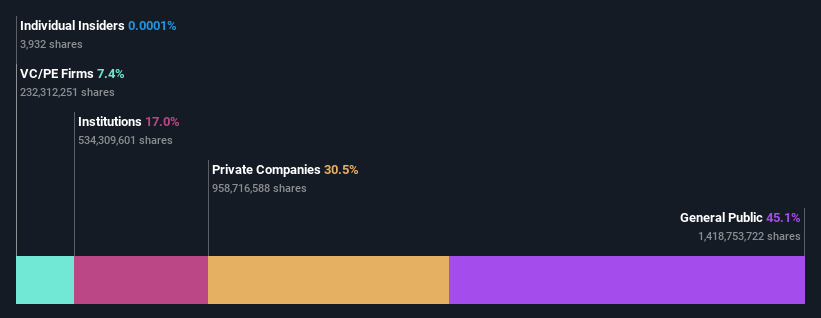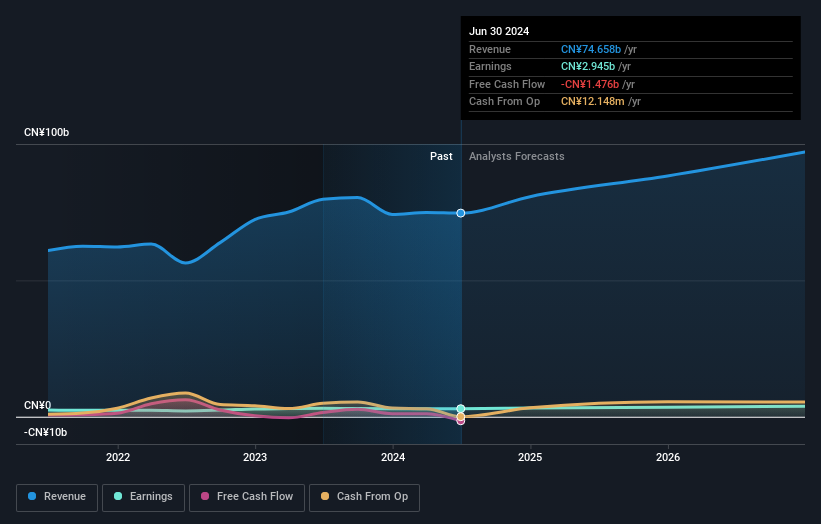While private companies own 30% of Shanghai Tunnel Engineering Co., Ltd. (SHSE:600820), retail investors are its largest shareholders with 45% ownership
Key Insights
- Shanghai Tunnel Engineering's significant retail investors ownership suggests that the key decisions are influenced by shareholders from the larger public
- A total of 16 investors have a majority stake in the company with 50% ownership
- Institutional ownership in Shanghai Tunnel Engineering is 17%
A look at the shareholders of Shanghai Tunnel Engineering Co., Ltd. (SHSE:600820) can tell us which group is most powerful. With 45% stake, retail investors possess the maximum shares in the company. That is, the group stands to benefit the most if the stock rises (or lose the most if there is a downturn).
Meanwhile, private companies make up 30% of the company’s shareholders.
Let's delve deeper into each type of owner of Shanghai Tunnel Engineering, beginning with the chart below.
See our latest analysis for Shanghai Tunnel Engineering

What Does The Institutional Ownership Tell Us About Shanghai Tunnel Engineering?
Institutional investors commonly compare their own returns to the returns of a commonly followed index. So they generally do consider buying larger companies that are included in the relevant benchmark index.
As you can see, institutional investors have a fair amount of stake in Shanghai Tunnel Engineering. This implies the analysts working for those institutions have looked at the stock and they like it. But just like anyone else, they could be wrong. When multiple institutions own a stock, there's always a risk that they are in a 'crowded trade'. When such a trade goes wrong, multiple parties may compete to sell stock fast. This risk is higher in a company without a history of growth. You can see Shanghai Tunnel Engineering's historic earnings and revenue below, but keep in mind there's always more to the story.

Shanghai Tunnel Engineering is not owned by hedge funds. Shanghai Urban Construction (Group) Corporation is currently the largest shareholder, with 30% of shares outstanding. Meanwhile, the second and third largest shareholders, hold 7.4% and 4.5%, of the shares outstanding, respectively.
After doing some more digging, we found that the top 16 have the combined ownership of 50% in the company, suggesting that no single shareholder has significant control over the company.
Researching institutional ownership is a good way to gauge and filter a stock's expected performance. The same can be achieved by studying analyst sentiments. There are a reasonable number of analysts covering the stock, so it might be useful to find out their aggregate view on the future.
Insider Ownership Of Shanghai Tunnel Engineering
The definition of company insiders can be subjective and does vary between jurisdictions. Our data reflects individual insiders, capturing board members at the very least. Management ultimately answers to the board. However, it is not uncommon for managers to be executive board members, especially if they are a founder or the CEO.
Most consider insider ownership a positive because it can indicate the board is well aligned with other shareholders. However, on some occasions too much power is concentrated within this group.
Our most recent data indicates that insiders own less than 1% of Shanghai Tunnel Engineering Co., Ltd.. However, it's possible that insiders might have an indirect interest through a more complex structure. It is a pretty big company, so it would be possible for board members to own a meaningful interest in the company, without owning much of a proportional interest. In this case, they own around CN¥26k worth of shares (at current prices). It is good to see board members owning shares, but it might be worth checking if those insiders have been buying.
General Public Ownership
With a 45% ownership, the general public, mostly comprising of individual investors, have some degree of sway over Shanghai Tunnel Engineering. This size of ownership, while considerable, may not be enough to change company policy if the decision is not in sync with other large shareholders.
Private Equity Ownership
Private equity firms hold a 7.4% stake in Shanghai Tunnel Engineering. This suggests they can be influential in key policy decisions. Some investors might be encouraged by this, since private equity are sometimes able to encourage strategies that help the market see the value in the company. Alternatively, those holders might be exiting the investment after taking it public.
Private Company Ownership
We can see that Private Companies own 30%, of the shares on issue. It might be worth looking deeper into this. If related parties, such as insiders, have an interest in one of these private companies, that should be disclosed in the annual report. Private companies may also have a strategic interest in the company.
Next Steps:
I find it very interesting to look at who exactly owns a company. But to truly gain insight, we need to consider other information, too. To that end, you should learn about the 2 warning signs we've spotted with Shanghai Tunnel Engineering (including 1 which is potentially serious) .
Ultimately the future is most important. You can access this free report on analyst forecasts for the company.
NB: Figures in this article are calculated using data from the last twelve months, which refer to the 12-month period ending on the last date of the month the financial statement is dated. This may not be consistent with full year annual report figures.
Have feedback on this article? Concerned about the content? Get in touch with us directly. Alternatively, email editorial-team (at) simplywallst.com.
This article by Simply Wall St is general in nature. We provide commentary based on historical data and analyst forecasts only using an unbiased methodology and our articles are not intended to be financial advice. It does not constitute a recommendation to buy or sell any stock, and does not take account of your objectives, or your financial situation. We aim to bring you long-term focused analysis driven by fundamental data. Note that our analysis may not factor in the latest price-sensitive company announcements or qualitative material. Simply Wall St has no position in any stocks mentioned.
 Index Options
Index Options CME Group
CME Group Nasdaq
Nasdaq Cboe
Cboe TradingView
TradingView Wall Street Journal
Wall Street Journal